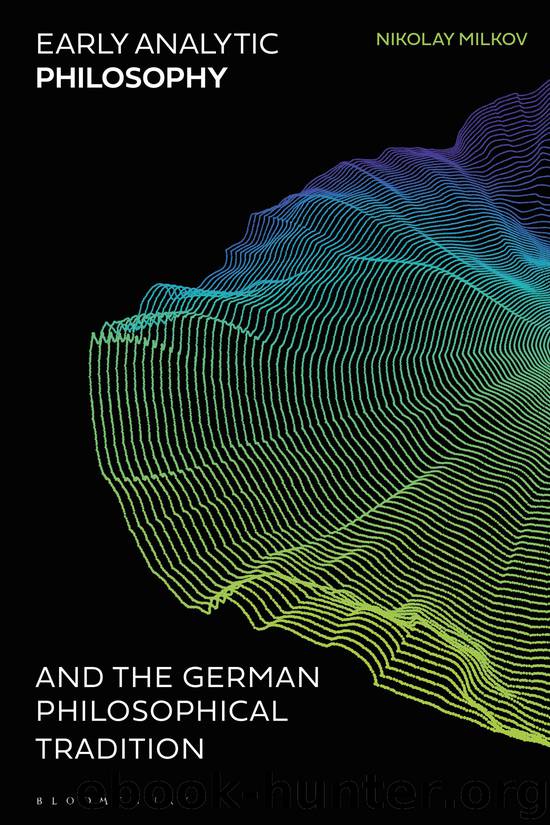Early Analytic Philosophy and the German Philosophical Tradition by Nikolay Milkov;

Author:Nikolay Milkov;
Language: eng
Format: epub
ISBN: 9781350086456
Publisher: Bloomsbury UK
Part Five
Two Neglected German Proto-analytic Philosophers
12
G. E. Moore and Johannes Rehmke
1 Introduction: Moore and German-speaking Philosophy
In recent years, several attempts have been made to show that Moore’s “revolution in philosophy,” which took place at the beginning of the twentieth century, was influenced by certain developments in the Germanophone philosophy of the time. Different avenues have been explored for this purpose. Some authors have claimed that in his formative years, Moore was under the decisive influence of Franz Brentano,1 an influence that came via George Stout (Bell 1999); others turn their attention to similarities between Moore and Husserl (Künne 1991).2 In Chapter 6: § 7, we have shown that the roots of German influence on Moore are even older—indeed, they can be traced back to Hermann Lotze.
In this chapter we shall demonstrate that the young Moore became acquainted with works of another group of German-speaking philosophers, that of the Greifswald objectivists, who date from the beginning of the twentieth century. Moreover, he showed considerable interest in them, and apparently was influenced by them. Unfortunately, today the school of the Greifswald objectivists—the most radical critics of psychologism in philosophy ever—has been consigned to oblivion. Not that the school was poor in ideas or arguments. The trouble is that in contrast to other Central European philosophical schools or philosophers, for example, to the school of the Austrian Brentanists, or to Frege, it failed to resurface after the Second World War.3
Fortunately, interest in the Greifswald objectivists has been recently revived by Martin Kusch (1995: 99, 118 ff.). The ideas developed in this chapter have been prompted by this newly awoken interest. To be more explicit, we shall trace Moore’s connection with the Greifswald objectivists via one of his most obscure papers: his review of Dimitri Michaltschew, Philosophische Studien: Beiträge zur Kritik des modernen Psychologismus (1909), published in the January issue of Mind, 1911. Even such a careful investigation of his philosophy as Thomas Baldwin’s G. E. Moore (1990) is silent about it. Why did he write it? What is its place in Moore’s philosophical development?
2 Moore and Michaltschew
2.1 Some Facts of Moore’s Philosophical Biography
In order to find out why Moore wrote the Michaltschew review at all, we are first going to locate it on the map of his philosophical development.
After he graduated from Cambridge in 1896, Moore won a six-year fellowship at Cambridge’s Trinity College (1898–1904). These years were most successful for his philosophical career. In 1903 he published the programmatic paper “The Refutation of Idealism.” In the same year his magnum opus, Principia Ethica, was brought out. Despite the fact that the book won wide public recognition (among its admirers were such leading British intellectuals of the time as E. M. Forster, J. M. Keynes, and Virginia Woolf), Moore was not pleased with it. The reason for this is to be found in the fact that in the same year his closest philosophical friend—and rival—Bertrand Russell published The Principles of Mathematics. This book convinced Moore that Russell was speeding ahead of him in philosophy and logic, and that he must make up for lost time.
Download
This site does not store any files on its server. We only index and link to content provided by other sites. Please contact the content providers to delete copyright contents if any and email us, we'll remove relevant links or contents immediately.
The remains of the day by Kazuo Ishiguro(8350)
Tools of Titans by Timothy Ferriss(7760)
Giovanni's Room by James Baldwin(6772)
The Black Swan by Nassim Nicholas Taleb(6732)
Inner Engineering: A Yogi's Guide to Joy by Sadhguru(6419)
The Way of Zen by Alan W. Watts(6264)
Asking the Right Questions: A Guide to Critical Thinking by M. Neil Browne & Stuart M. Keeley(5333)
The Power of Now: A Guide to Spiritual Enlightenment by Eckhart Tolle(5307)
The Six Wives Of Henry VIII (WOMEN IN HISTORY) by Fraser Antonia(5206)
Astrophysics for People in a Hurry by Neil DeGrasse Tyson(4982)
12 Rules for Life by Jordan B. Peterson(4151)
Housekeeping by Marilynne Robinson(4039)
The Ethical Slut by Janet W. Hardy(4019)
Skin in the Game by Nassim Nicholas Taleb(3951)
Double Down (Diary of a Wimpy Kid Book 11) by Jeff Kinney(3893)
Ikigai by Héctor García & Francesc Miralles(3847)
The Art of Happiness by The Dalai Lama(3830)
Skin in the Game: Hidden Asymmetries in Daily Life by Nassim Nicholas Taleb(3708)
Walking by Henry David Thoreau(3668)
